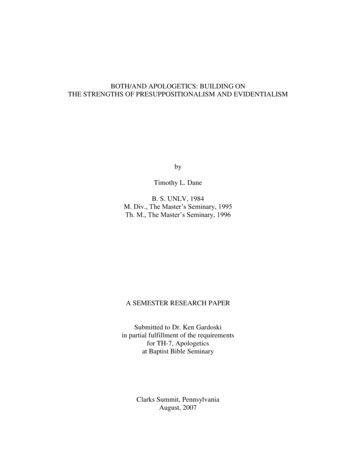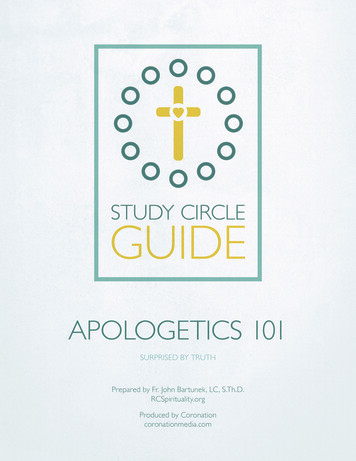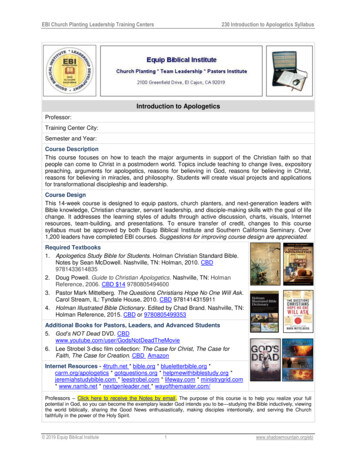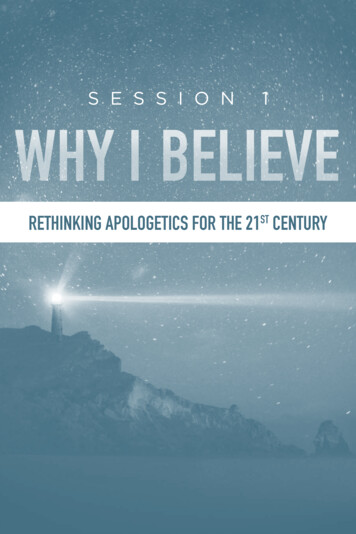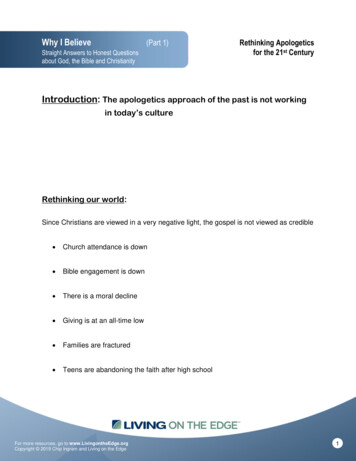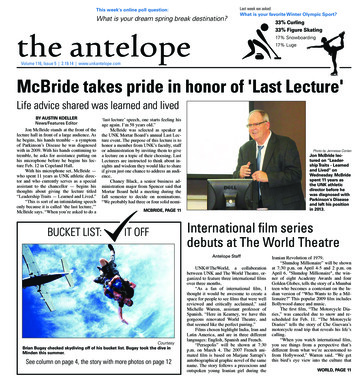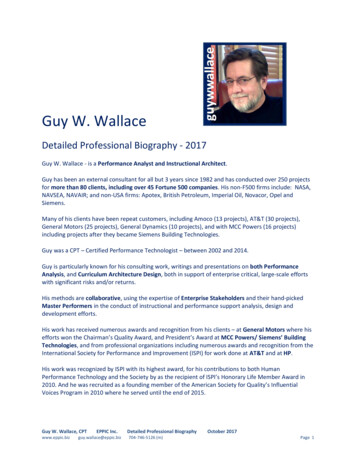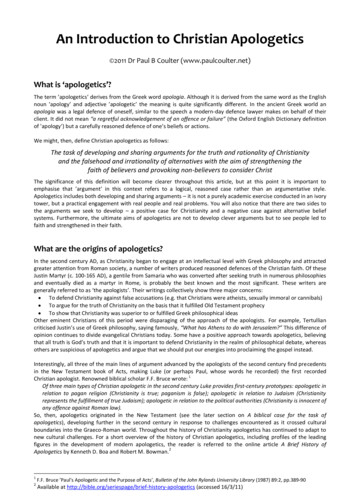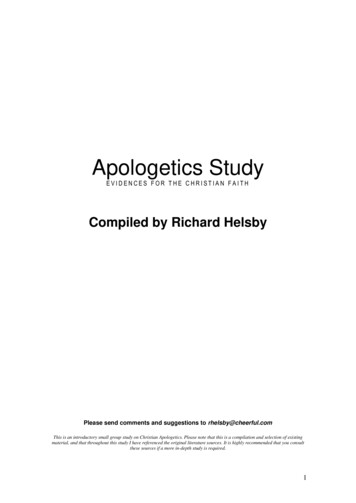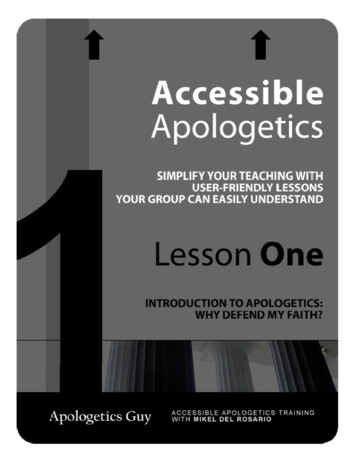
Transcription
Copyright InformationAll contents copyright 2010 by Mikel Del Rosario. All rights reserved.This publication is protected under the US Copyright Act of 1976 and all other applicableinternational, federal, state and local laws. No part of this document or the related filesmay be reproduced or transmitted in any form, by any means (electronic, photocopying,recording, or otherwise) without the prior written permission of the author.Usage LicenseIf you have purchased this lesson in eBook format, the author grants you permission toprint this document for use in your teaching.Support Accessible Apologetics TrainingPurchase more apologetics resources at: http://apologeticsguy.com/resources
Lesson 1Accessible ApologeticsIntroductionBy Mikel Del Rosario ApologeticsGuy.comPage 1
Lesson 1Accessible ApologeticsLesson 1: Outline“But in your hearts set apart Christ as Lord. Always beprepared to give an answer to everyone who asks you togive the reason for the hope that you have. But do thiswith gentleness and respect.”Introduction to ApologeticsI. What is Christian Apologetics?II. Why Defend the Faith?‐ Peter, the Apostle (1 Peter 3:15 NIV)Introduction:Want to study Apologetics?You won’t be sorry!An “apologetic” is simply a defense. Peter actually commanded all believers to be readywith answers when people ask us about our faith. In 1 Peter 3:15, the word translated as“answer” is the word apologia, which means “a reasoned statement or argument.” 1Obeying this command just means you’ve got reasons for what you believe and you’reready to talk with anyone who’s got questions. It doesn’t mean getting defensive. Itdoesn’t mean getting into fights. It means speaking the truth in love as we represent ourLord at work, at school, in our community and society. But in order to be prepared, we’vegot to know what we believe and why we believe it.That’s what this course in defending the faith is all about‐‐‐increasing your confidence as aChristian by exploring the reasons and evidences for the faith, and preparing yourself tobe a more effective ambassador of Jesus Christ.Defend without being defensiveEven if you’re totally new to this, there’s apologetic value in a confident believer simplyremaining calm under fire. Many people who oppose the faith often repeat slogansthey’ve heard but never really considered: “The Bible’s full of contradictions,” “Christians1Thayer and Smith, “Apologia ‐ Greek Lexion,” iew.cgi?number 627 (accessed June 4, 2010).By Mikel Del Rosario ApologeticsGuy.comPage 2
Lesson 1Accessible Apologeticsare intolerant,” “All religions are basically the same.” Relax. No need to get defensive.Remember that the truth is on our side, and lies are not defensible.One of my favorite radio show hosts, Greg Koukl, often says that apologetics can “lookmore like diplomacy than combat.” 2 I like that. Sincerely asking questions like “What doyou mean by that?” or “How did you come to that conclusion?” can help critics considerwhat they believe and why they believe it—perhaps for the first time. And if you’restumped by a question, it’s no problem to say, “Let me think about that and get back toyou.” Afterwards, do your homework and look it up. You’ll find there are good answers tothe hard questions.Argue without being argumentativear·gueWhen we say “argue,” we don’t mean(ahr‐gue) verbgetting into fights. Paul said we shouldn’tbe mean, contentious or going around1. To present reasons for or against a thing.looking for a fight (2 Tim. 2:24). But he2. To contend in oral disagreement.didn't say we couldn’t have arguments in3. To state the reasons for or against.the sense of having reasonedDictionary.com Unabridged. Based on the Random Housedisagreements about important issues. InDictionary, Random House, Inc. 2010.fact, he said we should humbly teachthose who oppose the truth so they could"come to their senses” and be saved (2 Timothy 2:25‐26). Because of this, we’re going tostudy some of the best arguments for the truth of the Christian faith together.Part of loving God with our minds (Mark 12:30) is using our mental faculties to drawconclusions about Him and His world based on Scripture, observation, and carefulthinking. Indeed, the ability to argue well is important for rational discussion aboutspiritual matters. In this sense, an argument is actually a good thing because it helps usdiscover and clearly communicate truth.2Koukl also mentions this in Ravi Zacharias et al., To Everyone an Answer: A Case for the Christian Worldview:Essays in Honor of Norman L. Geisler, ed. Francis J. Beckwith, William Lane Craig, James Porter Moreland and Norman L.Geisler (Downers Grove, Ill.: IVP Academic, 2004), 48.By Mikel Del Rosario ApologeticsGuy.comPage 3
Lesson 1Accessible ApologeticsSpeak the truth in loveAre we ready to do the hard work of discovering truth and defending it against error? Ifnot, we may fall prey to the latest piece of misinformation popularized by our culturethrough music, movies or literature. Consider the connection between truth, love anddiscipleship:“Then we will no longer be infants, tossed back and forth by the waves, and blown here andthere by every wind of teaching and by the cunning and craftiness of men in their deceitfulscheming. Instead, speaking the truth in love, we will in all things grow up into him who is theHead, that is, Christ.”‐ Paul, the Apostle (Ephesians 4:14‐15 NIV)This literally means “truthing in love,” and includes the ideas of “living” and “doing” thetruth. 3 Here’s the point: Since the church grows in maturity through truth and love, falseideas and unloving attitudes are major obstacles to our discipleship. If becoming likeJesus is our end goal, “speaking the truth in love” is an important part of getting there.If we’re doing this, gentleness and respect will be a natural part of our apologetic.Unfortunately, some Christians are quick to quote 1 Peter 3:15, but don’t really live outthe command because they treat the last part of the verse like a suggestion. It’s not. Andit doesn’t honor God when we act like jerks. We’ve got to study and present the truth—not for the sake of winning arguments or looking smart—but because we love God andlove people. It’s an obedience thing. It’s a love thing. And when people come to faith, it’salways a God thing.Let’s embark on this course together as an act of discipleship to Jesus.Mikel Del RosarioApologetics Speaker & Trainermikel@apologeticsguy.com3John R.W. Stott, Message of Ephesians: God's New Society (The Bible Speaks Today), New Ed ed. (Downers Grove:Inter‐Varsity Press, 1984), 172.By Mikel Del Rosario ApologeticsGuy.comPage 4
Lesson 1Accessible ApologeticsLesson 1:Why Defend My Faith?By Mikel Del Rosario ApologeticsGuy.comPage 5
Lesson 1Accessible ApologeticsLesson OverviewPreparation Apologetics means defending the faith and givingreasons to believe that Christianity is true.Jesus and his disciples gave people reasons tobelieve their teachings were actually true.We’re commanded to be ready to give peoplereasons for the hope that we have in Jesus, butwe’ve got to do it with humility and respect. Physical Objects Lesson Objectives Students will learn what apologetics is and why it’simportant for all Christians to defend the faith.Students will construct thoughtful responses tocommon Christian objections to studyingapologetics. 1 Peter 3:15Mark 2:1‐12Time Dramatic reading of Mark 2:1‐12Group activityLecture Notes Grab a ping pong paddle to illustrate the mnemonicdevice on page 10.You could write the mnemonic device on ping pongballs to help your students’ memory.hhhhhhhhhhhhhhhhhhhInteractive OptionsPrimary Scriptures Read the introduction and so you can share theseideas before diving into the main lesson.Ask a few students to prepare a dramatic reading ofMark 2:1‐12. Got 45 minutes to a full hour per class? You canteach this over two sessions. Consider ending thefirst session on page 9 and beginning the secondsession with a review of the material alreadycovered.Got an hour and a half per class? This lesson willeasily last the whole session. Go for as manyinteractive options as time allows!Getting Things Started By Mikel Del RosarioUnderlined sections correspond to the fill‐in‐the‐blank sections of the Student Guide.Highlighted definitions also appear in the StudentGuide. Ever had to defend your Christian convictions?Ever told anyone why you believe Christianity istrue?Ever told anyone why you don’t believe anotherreligion or idea is true?If so, you’ve already been involved in somethingcalled “apologetics.”ApologeticsGuy.comPage 6
Lesson 1Accessible ApologeticsI.What is Christian Apologetics?A. About the Discipline1. It’s a theoretical discipline:“Apologetics is that branch ofChristian theology which seeks toprovide a rational justification for thetruth claims of the Christian faith.”– William Lane Craig 42. It has practical application:a. To confirm for believers that theChristian faith is true.b. To show unbelievers that theChristian faith is ) noun1. The branch of theology that isconcerned with defending or provingthe truth of Christian doctrines.2. Formal argumentation in defense ofsomething, such as a position orsystem.The American Heritage Dictionary of the EnglishLanguage, Fourth Edition. Houghton Mifflin Company,2004. Dictionary.com3. There’s offensive (positive) apologetics:a. Focuses on building a positive case for Christianityb. This is where you give someone good reasons to believec. This includes:1) Showing that God exists2) Showing that Christianity is true4. There’s defensive (negative) apologetics:a. Focuses on responding to challenges to the faithb. This is where you refute arguments against the truth of Christianityc. This includes:1) Refuting objections to belief in God2) Refuting objections to Christianity4William Lane Craig, Reasonable Faith: Christian Truth and Apologetics, 3 ed. (Wheaton: Crossway Books, 2008),15.By Mikel Del Rosario ApologeticsGuy.comPage 7
Lesson 1Accessible Apologeticsd. “Apologetics is simply to defend the faith, and thereby destroy arguments andevery proud obstacle against the knowledge of God (2 Cor. 10:5). It is openingthe door, clearing the rubble, and getting rid of the hurdles so that people cancome to Christ.” –Norman Geisler 55. It involves other disciplines: Christian apologists can use evidence andarguments from history, science, philosophy, theology, ethics, and a variety ofother disciplines.B. Three Essential Elements of Apologetics1. To understand the answers to tough questions about Christianity2. To give good answers to those who ask tough questions about Christianity3. To do this in a wise and tactical manner in our apologetic encountersII.Why Defend My Faith?6A. Jesus Gave People Reasons to Believe1. Jesus gave people reasons to believe (in many different ways).2. “Jesus demonstrated the truth of His message and his identity over and overagain, using nearly every method at his disposal, including miracle, prophecy,godly style of life, authoritative teaching and reasoned argumentation.”– Craig Hazen 73. For example, Jesus “gave many convincing proofs” of His resurrection (Acts 1:3).5Quoted by Josh McDowell in To Everyone an Answer, 9.Adapted from “Defending the Defense of the Faith” in To Everyone an Answer, 37‐46.7Ibid, 39.6By Mikel Del Rosario ApologeticsGuy.comPage 8
Lesson 1Accessible ApologeticsB. Case Study: Healing ofthe Paralytic (Mark 2:1‐12)1. First, Jesus said, “Your sinsare forgiven.”2. Then, he did a miracle andhealed the man. Why?Because you can’t tell ifJesus forgiving the guy reallymeant he was forgiven byGod. Did it work? Cananyone else besides Godforgive sins?Interactive Option To introduce this case study, have someparticipants present a prepared, dramaticreading of Mark 2:1‐12. Have two or three readers take on the roles ofthe narrator, Jesus, the teachers, and theobservers. Direct the students to imagine that they wereone of the people listening to Jesus teachwhen this event happened. Ask, “Why did Jesus heal this man?”3. Jesus gave people a good reason to know that he had authority from God toforgive sins—and by implication, that he was the divine Messiah.a. Jews assumed the Messiah would have supernatural powerb. For example, signs of the Messianic era: the deaf would hear, the lame wouldwalk, the mute would shout (Isaiah 35:5‐6).4. Another time, Jesus said the ultimate sign of his Messiahship would be his deathand resurrection (Luke 11:29).5. This wasn’t new. Jesus was following God’s example from the Old Testament.a. 1 Kings 18:20‐45 Elijah’s Mount Carmel showdown against Baal’s prophetsmiraculously proved Yahweh was the true God.b. Isaiah 41:21‐22 God says to his enemies, “Present your case. Set forth yourarguments.”By Mikel Del Rosario ApologeticsGuy.comPage 9
Lesson 1Accessible ApologeticsC. Jesus’ Disciples Provided Reasons to Believe1. Jesus’ disciples followed His example and told other believers to do the samething.a. Jesus gave people reasons to believe.b. Jude told believers to contend for the faith (Jude 3)c. Luke believed eyewitness testimony and careful history would helpTheophilus know with certainty that the things he was taught are true. That’swhy he wrote Luke‐Acts (Luke 1:1‐4).d. Peter said to always be ready to give a reason for the hope you have in Jesus,but with humility and respect (1 Peter 3:15).e. Paul was explaining and proving that Jesus was the Messiah. Because of this,many Jews and God‐fearing Greeks in Thessalonica were persuaded andjoined them (Acts 17:2‐4)2. You can use the mnemonic device, “Jo Jo likes ping pong,” to remember thatJesus, Jude, Luke, Peter and Paul believed in persuading and giving peoplereasons to believe.3. Here’s the point: The Holy Spirit has used believers who reason, persuade, andpresent evidence to lead people to salvation in Christ.4. Practice using the mnemonic device, “Jo Jo likes ping pong,” to recite this list ofnames from memory.5. Choose a partner and ask them why we should give unbelievers reasons tobelievea. See if they can explain how Jesus and his disciples gave unbelieversreasons to believe.b. Switch. See if you can explain this to your partner.By Mikel Del Rosario ApologeticsGuy.comPage 10
Lesson 1Accessible ApologeticsGoing for two sessions?Wrap‐up here This is a good place to wrap up your first session. Summarize your discussion.Ask the class: “What is Christian Apologetics?” “Why is it important to study this?” “Why should we be ready to give reasons for what we believe?”Application Challenge students to memorize 1 Peter 3:15. Begin the next session with a review. Introduce the next section by asking, “Why would a Christianever say we shouldn’t study apologetics or give reasons for ourfaith?” (various answers) Say, “Let’s analyze some of these common objections.”By Mikel Del Rosario ApologeticsGuy.comPage 11
Lesson 1Accessible ApologeticsGroup Activity Have the students break into groups. Assign each group to brainstorm a response to one objectiondiscussed on the next page.o Going for two sessions? If so, you’ve got a lot more time.Do the first one together as a class.o Then, have each group work though each of the last 3objections.o Be sure to debrief after each one. Visit each group. Help participants discover the problemswith each objection and come up with a suggested response(timing will vary). Have a spokesperson share their group’s suggested responsewith the class and explain how they worked through thisobjection. Debrief the activity and teach through the material outlinedin D and E (p. 14 – 17).By Mikel Del Rosario ApologeticsGuy.comPage 12
Lesson 1Accessible ApologeticsBy Mikel Del Rosario ApologeticsGuy.comPage 13
Lesson 1Accessible ApologeticsD. Christian Objections to Studying Apologetics1. Objection: “People don’t come to faith in Christ through apologetics.”a. If that’s true, why do Jude and Peter command believers to give reasons forthe faith?b. If that’s true, why was Paul reasoning, proving, and persuading if these thingswere no good?c. Paul’s persuasion resulted in “large numbers” coming to faith in Acts 17:2‐4.d. This objection is simply false. But why would a Christian say something likethis? (Various answers; Ex: Maybe they don’t know people who came to faiththrough apologetics)c. People come to faith through the work of the Holy Spirit, but there are manytools the Holy Spirit uses to do the work. One of them is apologetic reasoning.i. Augustine writes in his Confessions about how he was as led towardChristianity by hearing a Christian debate an unbeliever 8ii. C.S. Lewis rejected his atheism and came to Christ under the influence ofapologetics. 9d. Occasionally, apologetic argument is the main tool that brings people to faith.e. Sometimes, it’s more of a secondary thing.8Apologetics, Need for. Norman L. Geisler, Baker Encyclopedia of Christian Apologetics (Baker Reference Library)(Grand Rapids, Mich.: Baker Academic, 1998), 41.9Ibid. Entry also includes Lewis’ quote from God in the Dock: “Nearly everyone I know who has embracedChristianity in adult life has been influenced by what seemed to him a probable argument for Theism.”By Mikel Del Rosario ApologeticsGuy.comPage 14
Lesson 1Accessible Apologetics2. Objection: “Don’t give reasons to believe. Without faith, it’s impossible toplease God.”a. What’s this mean?1) This implies that providing evidence for Christianity or reasons tobelieve actually removes a person’s need for faith.2) But this comes from a misinterpretation of Hebrews 11:6 which isbased on an unbiblical definition of the word “faith.”b. Biblical faith isn’t a “blind faith” that’s opposed to reason, evidence or logic.1) 1 Cor. 15:12‐19 Although Paul could have encouraged faith that rejectsevidence, he boldly pins the truth of Christianity on a historical eventwhich can be tested for truth by reason and evidence.2) Paul says that if Jesus didn’t rise from the dead, Christianity is false.c. Biblical faith isn’t blind; it’s dependent on a historical event that can beinvestigated.d. Another word for faith is “trust;” and we can definitely trust what we know istrue.e. Our faith is stronger when we have good reasons to believe in someone wetrust.3. Objection: “Don’t give reasons to believe. Just preach the Word because it willnot return void.”a. This comes from a misuse of Isaiah 55:11.1) The word “just” implies that nothing else is needed in order forScripture to begin its work in a person’s heart.2) But this verse doesn’t include the word “just.”b. Jesus and the apostles showed that other things could advance the gospel.c. For example, they used miracles, godly lifestyle, prophecy, and reasonedargumentation to show the gospel message was true.d. It wouldn’t make sense for Peter and Jude to command believers to defendthe faith if the only “right way” to make disciples is by directly preaching thegospel.By Mikel Del Rosario ApologeticsGuy.comPage 15
Lesson 1Accessible ApologeticsE. Christian Objections to Supporting Scripture with Evidence1. Objection: “Don’t give reasons to believe. We must believe Scripture’s truebecause it says it’s true or else you’re ‘testing Scripture’ by another standard‐‐‐and that’s bad.”a. Some say that presenting evidence for the truth of Scripture means you are“judging” the text by a “more ultimate” standard. But what does the Bibleitself teach about this?b. Prophets like Elijah did not limit appeals to Scripture, but used historicalevidence.1) 1 Kings 18:20‐45: Elijah vs. Baal’s prophets.2) Elijah said, “The God who answers by fire, He is God.”3) The people were challenged to view an awesome miracle to vindicateElijah’s message.4) Elijah used historical evidence to support God’s word.c. Even God did not limit appeals to Scripture, but used historical evidence. 101) In Isaiah, God issued a challenge to false gods: Let them predict thefuture and make their predictions come true and prove they are gods(Is. 41:21‐24; 44:7).2) Turns out, only God can pass this test (Is. 41:25‐29; 42:9; 44:24‐28;46:10; 48:5, 14).3) The Jews were called to be witnesses of these historic events (Is. 44:6‐8; 52:6).10William Lane Craig, Gary Habermas and John Frame, eds., Five Views on Apologetics, ed. Steven B. Cowan (GrandRapids, Mich.: Zondervan, 2000), 245.By Mikel Del Rosario ApologeticsGuy.comPage 16
Lesson 1Accessible Apologeticsd. In the New Testament, both Peter (Acts 2:22‐24) and Paul (Acts 16:30‐31) saidthat Jesus’ resurrection validated His teachings.1) So Peter and Paul used historical evidence to support Jesus’ words.e. Jesus didn’t limit appeals to Scripture, but used historical evidence (miracles):1) When John’s disciples asked Jesus if he was the one to come or if theyshould be waiting for someone else, He didn’t appeal to His own word.2) Rather, Jesus appealed to historical evidence‐‐‐miracles which showedpeople His Messianic authority (Matt. 11:4‐5, Luke 7:18‐23).3) Jesus used historical evidence to support His word.2. Objection: “People won’t repent no matter how much evidence you givethem.”a. Matt. 11:20‐21 shows that Jesus knows what would happen in any givencircumstance, including people’s free choices:b. “Then Jesus began to denounce the cities in which most of his miracles hadbeen performed, because they did not repent. ‘Woe to you, Korazin! Woe toyou, Bethsaida! If the miracles that were performed in you had beenperformed in Tyre and Sidon, they would have repented long ago in sackclothand ashes.”’c. Remember that the Holy Spirit can use a variety of things to bring people torepentance including: A clear presentation of the gospel, a godly lifestyle,your personal testimony, and arguments and evidence, too.1) There are many tools the Holy Spirit can use.2) One of them is historical evidence.By Mikel Del Rosario ApologeticsGuy.comPage 17
Lesson 1Accessible ApologeticsClosing TimeWrap‐up here Ask for any clarification questions. Summarize your discussion.Ask the class: “What is Christian Apologetics?” “Why is it important to study this?” “Why should we be ready to give reasons for what webelieve?”Application Tell someone you’re taking this class and explain to them howJesus and his disciples gave unbelievers reasons to believe. Memorize 1 Peter 3:15.By Mikel Del Rosario ApologeticsGuy.comPage 18
Lesson 1Accessible ApologeticsWorks Cited Craig, William Lane, Gary Habermas, and John Frame, eds. Five Views on Apologetics.Edited by Steven B. Cowan. Grand Rapids, Mich.: Zondervan, 2000. Craig, William Lane. Reasonable Faith: Christian Truth and Apologetics. 3 ed. Wheaton:Crossway Books, 2008. Geisler, Norman L. Baker Encyclopedia of Christian Apologetics (Baker ReferenceLibrary). Grand Rapids, Mich.: Baker Academic, 1998. Stott, John R.W. Message of Ephesians: God's New Society (The Bible Speaks Today).New Ed ed. Downers Grove: Inter‐Varsity Press, 1984. Thayer, and Smith. “Apologia ‐ Greek Lexion.” iew.cgi?number 627 (accessed June 4, 2010). Zacharias, Ravi, William Dembski, Douglas Groothuis, Gary Habermas, Josh McDowell,Ben Witherington III, et al. To Everyone an Answer: A Case for the Christian Worldview:Essays in Honor of Norman L. Geisler. Edited by Francis J. Beckwith, William Lane Craig,James Porter Moreland and Norman L. Geisler. Downers Grove, Ill.: IVP Academic, 2004.By Mikel Del Rosario ApologeticsGuy.comPage 19
Lesson 1Accessible Apologetics Simplify Your Teaching and Save Time Like this lesson? Download the complete Lesson Pack! http://apologeticsguy.com/lessons The Lesson Pack further simplifies your teaching and saves you time. The Complete Lesson Pack Student Notes: Lesson outline with blanks, key definitions, works cited for further study. PowerPoint presentation: Professionally‐designed template and content for lesson. PowerPoint Handout: A ready‐to‐go PDF for students who missed out on the lesson. Download It Now The complete Lesson Pack is available for immediate download. Get it here: http://apologeticsguy.com/lessonsBy Mikel Del Rosario ApologeticsGuy.comPage 20
Accessible Apologetics Lesson 1 By Mikel Del Rosario ApologeticsGuy.com Page 2 Introduction: Want to study Apologetics? You won’t be sorry! An “apologetic” is simply a defense. Peter actually commanded al

